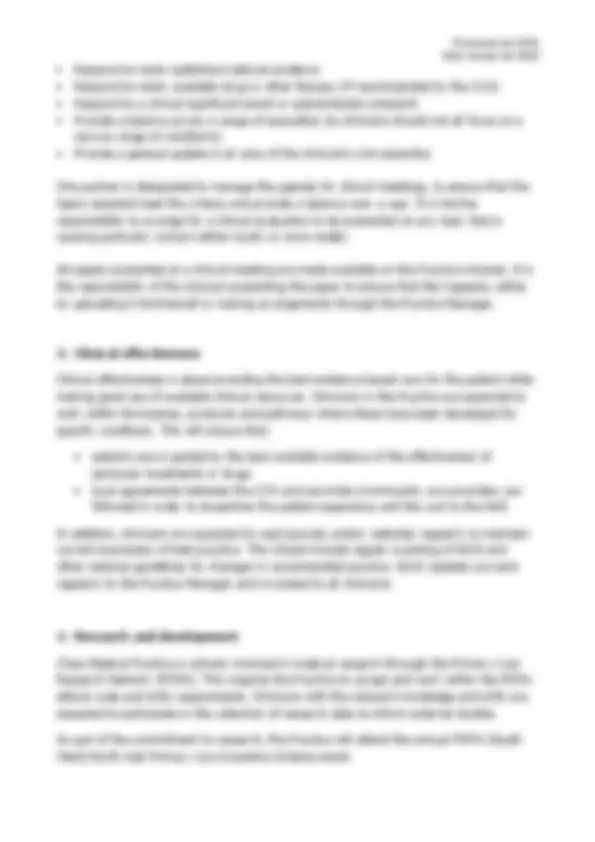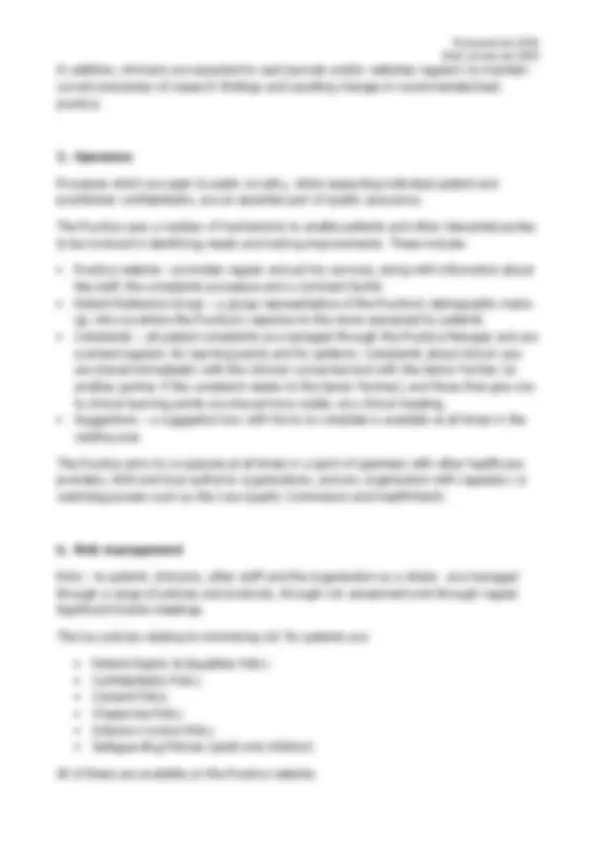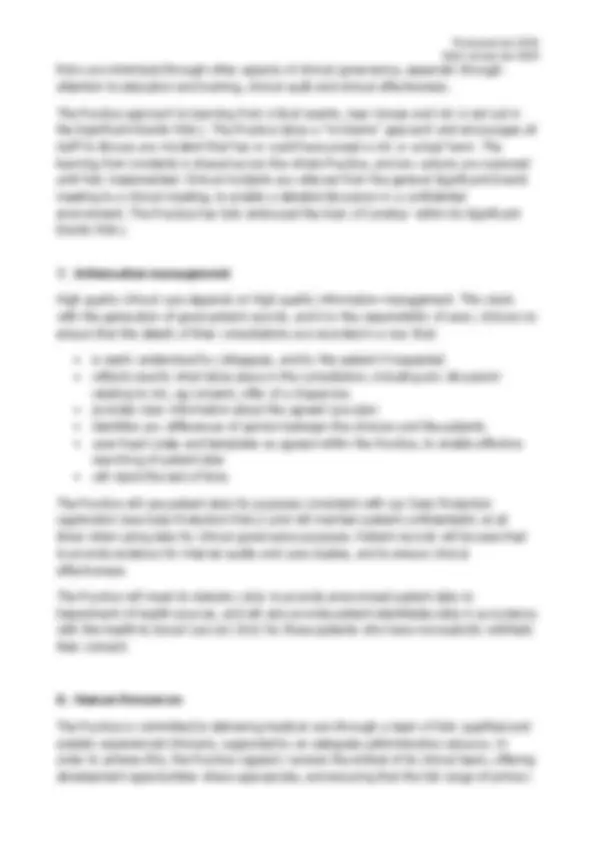





Study with the several resources on Docsity

Earn points by helping other students or get them with a premium plan


Prepare for your exams
Study with the several resources on Docsity

Earn points to download
Earn points by helping other students or get them with a premium plan
Community
Ask the community for help and clear up your study doubts
Discover the best universities in your country according to Docsity users
Free resources
Download our free guides on studying techniques, anxiety management strategies, and thesis advice from Docsity tutors
The Clinical Governance Policy of a Next review in January 2018, which sets the framework for NHS organisations to improve the quality of their services, safeguard high standards of care, and foster an environment for clinical excellence. The policy emphasizes the importance of recognizably high standards of care, an ethos of continuous improvement, and the role of clinicians and non-clinical staff in maintaining and updating their skills. It also covers the importance of clinical audit, clinical effectiveness, research and development, patient and public involvement, risk management, and information management.
Typology: Schemes and Mind Maps
1 / 6

This page cannot be seen from the preview
Don't miss anything!




Next review Jan 2018
Clinical governance is defined as:
A framework through which NHS organisations are accountable for continually improving the quality of their services and safeguarding high standards of care by creating an environment in which excellence in clinical care will flourish.
There are three key attributes to clinical governance:
Recognisably high standards of care Transparent responsibility and accountability for those standards An ethos of continuous improvement
Clinical governance refers to the structures, processes and systems in place in an organisation to manage the quality of service provision. This framework needs to be appropriate to each organisation, and this policy sets out the Chew Medical Practice approach.
There are eight key elements to clinical governance. These are outlined below, along with the mechanisms in use in the Practice to deliver each of the elements, and the expectations that are placed on partners and staff at the Practice.
1. Education and training
It is the professional duty of all clinical staff to keep their knowledge and skills up to date, and they must therefore engage in regular continuing professional development (CPD). For GPs, this is managed through the General Medical Council registration and revalidation process and through annual professional appraisals. For nurses it is managed through the Nursing & Midwifery Council revalidation process and annual internal appraisals. In addition, all partners and employees are bound by the Practice Mandatory Training Policy and schedule. All clinicians are expected to document their learning for their individual learning portfolios.
The Practice supports the ongoing development of GPs and nurses, both financially and by allowing time out of the surgery for CPD. For GPs, an annual allocation of study days and a contribution towards fees is set out in the contract of employment.
Next review Jan 2018 Following any external CPD paid for by the Practice, GPs and nurses are expected to share their learning with colleagues, either formally in clinical or nurse team meetings, or through informal means. It is the responsibility of each clinician to ensure that any urgent updates are brought to the attention of all colleagues to whom the information is relevant as soon as possible after the learning event.
Partners are committed to passing on knowledge and skills within the Practice. GPs have a responsibility to support the nursing team through formal teaching sessions as well as through ad hoc advice. The Practice will arrange a clinical meeting once a month, one of the functions of which is to allow clinicians with specialist knowledge to pass on updates to the rest of the clinical team.
The Practice approach to training for all staff is set out in the Training Policy. It is recognised that non-clinical staff also need to update their skills regularly in order to support the delivery of high quality medical services.
2. Clinical audit
Clinical audit is the review of clinical performance and the refinement of clinical practice as a result. Within the Practice, this may refer to:
the application of the results of formal national or local (eg CCG) audits to our patient population and the identification of areas for improvement audits carried out in the Practice by our clinicians or by external experts, eg CCG pharmacist, specialists provided by drug companies, which result in improvements in practice the use of case studies to highlight specific issues that are then generalised within our patient population
The monthly clinical meeting provides a forum for the dissemination of the results of audits and the exchange of opinions about how the results can be used to improve clinical practice. These meetings will be held on different days of the week and will be attended by all GPs and members of the nursing team who are able to be rostered to attend. Those clinicians not rostered to attend may choose to do so in their own time but in any case it is the responsibility of the clinician presenting a topic to ensure that all colleagues who are not present are made aware of the outcome. When appropriate, the meetings will be attended by the Practice Manager or other senior administrative staff to aid the process of dissemination and to ensure that any administrative changes needed to support improvement proposals are carried through.
The range of topics covered in local audits should meet one of the following key criteria:
Respond to an identified area where the Practice is an outlier compared with other BANES practices Respond to newly published local pathways
Next review Jan 2018 In addition, clinicians are expected to read journals and/or websites regularly to maintain current awareness of research findings and resulting changes in recommended best practice.
5. Openness
Processes which are open to public scrutiny, while respecting individual patient and practitioner confidentiality, are an essential part of quality assurance.
The Practice uses a number of mechanisms to enable patients and other interested parties to be involved in identifying needs and making improvements. These include:
Practice website – promotes regular and ad hoc services, along with information about the staff, the complaints procedure and a comment facility Patient Reference Group – a group representative of the Practice’s demographic make- up, who scrutinise the Practice’s response to the views expressed by patients Complaints – all patient complaints are managed through the Practice Manager and are scanned regularly for learning points and for patterns. Complaints about clinical care are shared immediately with the clinician concerned and with the Senior Partner (or another partner if the complaint relates to the Senior Partner), and those that give rise to clinical learning points are shared more widely at a clinical meeting. Suggestions – a suggestion box with forms to complete is available at all times in the waiting area
The Practice aims to co-operate at all times in a spirit of openness with other healthcare providers, NHS and local authority organisations, and any organisation with regulatory or watchdog powers such as the Care Quality Commission and HealthWatch.
6. Risk management
Risks - to patient, clinicians, other staff and the organisation as a whole - are managed through a range of policies and protocols, through risk assessment and through regular Significant Events meetings.
The key policies relating to minimising risk for patients are:
Patient Dignity & Equalities Policy Confidentiality Policy Consent Policy Chaperone Policy Infection Control Policy Safeguarding Policies (adult and children)
All of these are available on the Practice website.
Next review Jan 2018 Risks are minimised through other aspects of clinical governance, especially through attention to education and training, clinical audit and clinical effectiveness.
The Practice approach to learning from critical events, near misses and risk is set out in the Significant Events Policy. The Practice takes a “no blame” approach and encourages all staff to discuss any incident that has or could have posed a risk or actual harm. The learning from incidents is shared across the whole Practice, and any actions are reviewed until fully implemented. Clinical incidents are referred from the general Significant Events meeting to a clinical meeting, to enable a detailed discussion in a confidential environment. The Practice has fully embraced the Duty of Candour within its Significant Events Policy.
7. Information management
High quality clinical care depends on high quality information management. This starts with the generation of good patient records, and it is the responsibility of every clinician to ensure that the details of their consultations are recorded in a way that:
is easily understood by colleagues, and by the patient if requested reflects exactly what takes place in the consultation, including any discussion relating to risk, eg consent, offer of a chaperone provides clear information about the agreed care plan identifies any differences of opinion between the clinician and the patients uses Read codes and templates as agreed within the Practice, to enable effective searching of patient data will stand the test of time
The Practice will use patient data for purposes consistent with our Data Protection registration (see Data Protection Policy) and will maintain patient confidentiality at all times when using data for clinical governance purposes. Patient records will be searched to provide evidence for internal audits and case studies, and to ensure clinical effectiveness.
The Practice will meet its statutory duty to provide anonymised patient data to Department of Health sources, and will also provide patient-identifiable data in accordance with the Health & Social Care Act 2012 for those patients who have not explicitly withheld their consent.
8. Human Resources
The Practice is committed to delivering medical care through a team of fully qualified and suitably experienced clinicians, supported by an adequate administrative resource. In order to achieve this, the Practice regularly reviews the skillset of its clinical team, offering development opportunities where appropriate, and ensuring that the full range of primary